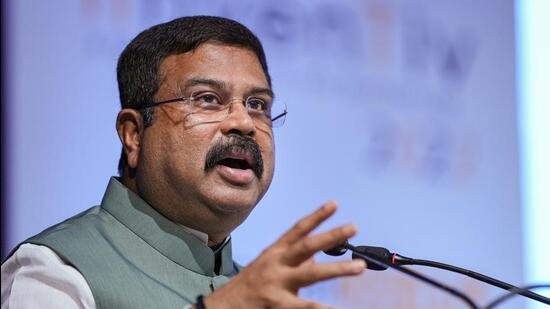Roots of democracy can be traced to India: Dharmendra Pradhan
Releasing the book, “India: the mother of democracy”, Union education minister Dharmendra Pradhan said that it was an attempt to showcase the democratic ethos ingrained in India since the beginning of the civilisation.
Democratic thoughts from the Arthaśāstra, governing principles from ancient sanskrit scriptures, democracy in the working of ”temple establishments”, and khap panchayats and democratic traditions in Haryana – these are among the topics covered in the Indian Council of Historical Research’s (ICHR) new book tracing “Indian democratic history” released on Thursday.

Releasing the book, “India: the mother of democracy”, Union education minister Dharmendra Pradhan said that it was an attempt to showcase the democratic ethos ingrained in India since the beginning of the civilisation.
“India’s civilisational ethos is one of the original sources of democracy, contrary to the narrative set by the western world. Roots of democracy can be traced to India as early as the 4th century. The stone inscriptions of Thanjavur are a living testimonial of the same… Evidence of societal systems that were at place during the Kalinga and Lichchhavi period also speak volumes about the democratic DNA of India,” he said.
It is likely the minister was referring to the stone inscriptions of Uthiramerur, a village near Chennai, dating back to the 10th century when the Chola empire, centred around Thanjavur, ruled vast parts of the peninsula. The Lichchavikas, who had a kingdom in the Gangetic plains in the 7th century BCE, formed a republic governed by an assembly. And Kalinga, in modern-day Odisha, was, as far back as 2nd century BCE, considered a democracy.
“A society that does not take pride in its civilisational prowess cannot think and achieve big… I am sure this book will encourage healthy debates on India’s democratic legacy and inspire future generations to cherish our timeless ethos,” the minister said.
The book has 30 articles written by 30 different authors tracing India’s democratic history, starting from the Harappan civilisation. It has been divided into six parts: archaeology, literature, numismatics and epigraphy; gana, mahajanapada, rajya: a legacy of ‘Loktantra’; bhakti and sampraday: visualising democratic traditions; the blossoming of democratic ‘Ism’s: Jainism, Buddhism and Sikhism; the idea of ‘Loka’: Janjati and Khaps; and tracing the ethos of democracy: humanity and colonialism.
The authors included renowne archeologist Vasant Shinde, professor Rajiv Lochan of Panjab University, professor Jigar Mohammad of Jammu University and professor Veenu Pant of Sikkim University.
“The nature of the book is completely academic and the authors are all academicians. They are all experts in their fields,” ICHR chairperson Raghuvendra Tanwar said.
ICHR member secretary Umesh Ashok Kadam, who is also one of the chief editors of the book, said: “We have tried to cover all the aspects of Indian democratic values through this book. For instance, the book begins with an article on Harappan civilisation, the architect of the democratic system in the world. We have also included a section on janjati and khaps because the way people understand khap is not correct. We want to present the actual meaning of khap and its democratic traditions in this book.”
In recent years, the khaps, representing clans, usually of Jats, have become infamous for their orthodoxy and patriarchy.
The themes of other chapters of the book include: “temple establishment functioning in democratic way”, “democratic tradition among the tribes of North East India”, and principles of democracy in ancient Sanskrit scriptures based on Śruti, Smṛti, Itihasa and Mahakavya.
“In ancient times, when we did not have banks and granaries, temples were everything for us. They were not just the sacred places of worship, but they also acted as banks and granaries and places of discourse. Therefore, they functioned in a proper democratic way,” Kadam said.
Last week, the University Grants Commission (UGC), in collaboration with ICHR, shared a concept note on “India: the mother of democracy” with all universities and asked them to organise lectures on the theme on Constitution Day, which is being celebrated on November 26.
UGC also wrote to all governors (who are also chancellors of universities), asking them to encourage higher education institutions in their respective states to organise lectures on the theme. The concept note created a controversy when the Communist Party of India (Marxist) raised concern over its content.
The CPI (M) raised objections over the content of the concept note that said “India was never an aristocratic nation” and on khap panchayats. It alleged that the UGC tried to negate the constitutional requirement of democratic consultation with the elected state government and directly approached the governors “appointed by RSS-BJP” to pursue the agenda.
Get Current Updates on India News, Lok Sabha Election 2024 live, Infosys Q4 Results Live, Elections 2024, Election 2024 Date along with Latest News and Top Headlines from India and around the world.




